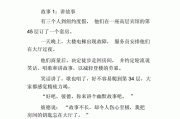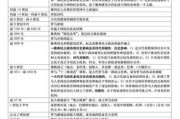历史故事:海豚救主成为生命奇迹 在古代,人们对海洋很少了解。海洋神话和传说让人们对海洋充满了恐惧和敬畏。然而,在一个古老的海滨城市,一个关于海豚的真...
2023-11-10 1733

China is one of the world's oldest civilizations, with a rich history spanning thousands of years. The country has been ruled by numerous dynasties and governments, each with its unique characteristics and contributions to Chinese culture and society. In this article, we will take a brief look at the major dynasties and periods of Chinese history.
The Xia Dynasty is considered the first dynasty in Chinese history. It is believed to have been established by the legendary Emperor Yu, who is said to have tamed the floods and laid the foundation for agricultural civilization. However, there is little archaeological evidence to support the existence of this dynasty.
The Shang Dynasty was the first dynasty that can be accurately traced through historical records and archaeological discoveries. It was a Bronze Age civilization that developed along the Yellow River. The Shang Dynasty is known for its use of bronze vessels in rituals and warfare. It also left behind an impressive legacy of oracle bones, which inscribed with questions about the future.
The Zhou Dynasty is one of the longest-lasting dynasties in Chinese history, lasting for more than 800 years. It is divided into two periods: the Western Zhou and the Eastern Zhou. The Western Zhou lasted from 1046-771 BCE, and the Eastern Zhou lasted from 771-256 BCE. This dynasty is known for its innovations in agriculture, science, and philosophy. The philosophers Confucius and Laozi both lived during this period.
The Qin Dynasty is the first dynasty that unified China under a centralized government. It was founded by Qin Shi Huang, who is known for the construction of the Great Wall of China. The Qin Dynasty is also known for its standardization of weights, measurements, and script. However, the Qin Dynasty was short-lived and was overthrown by a rebellion in 206 BCE.
The Han Dynasty is considered one of the golden ages of Chinese civilization. It was a time of prosperity, stability, and cultural flourishing. The Han Dynasty is known for its advancements in science, technology, and the arts. It also saw the establishment of the Silk Road trade route, which connected China with the rest of the world. The Han Dynasty is also famous for its emphasis on Confucianism.
The Tang Dynasty is often referred to as the "golden age" of Chinese history. It was a time of great achievement in literature, art, and science. The Tang Dynasty is known for its openness to foreign cultures and its great military expansion. It is also known for the emergence of the famous Tang poetry, which is characterized by its lyricism and romantic themes.
The Song Dynasty is known for its advancements in technology, agriculture, and trade. It was a time of great economic growth and cultural development. The Song Dynasty is famous for its invention of movable type printing and gunpowder. It also saw the rise of Neo-Confucianism and the establishment of the civil service exam system.
The Ming Dynasty is known for its great achievements in art, literature, and architecture. It was a time of prosperity and cultural flourishing. The Ming Dynasty is famous for its construction of the Forbidden City and the completion of the Great Wall of China. The Ming Dynasty was also a time of great maritime exploration, with the famous admiral Zheng He leading expeditions throughout Southeast Asia and the Indian Ocean.
The Qing Dynasty was the last dynasty in Chinese history. It was established by the Manchus, a group from northeastern China. The Qing Dynasty saw the expansion of the Chinese empire to its greatest extent. It also saw the growth of Western influence in China and the decline of the imperial system. The Qing Dynasty was overthrown by revolutionaries in 1912.
China's history is long and complex, with many dynasties and periods shaping its culture and society. From the Xia Dynasty to the Qing Dynasty, each era left behind its unique legacy and contributions. Understanding Chinese history is essential to understanding Chinese culture and society today.
相关文章

历史故事:海豚救主成为生命奇迹 在古代,人们对海洋很少了解。海洋神话和传说让人们对海洋充满了恐惧和敬畏。然而,在一个古老的海滨城市,一个关于海豚的真...
2023-11-10 1733

中国历史故事100个 中国历史悠久,留下了无数令人惊叹的故事和传说。这些故事不仅展示了人民的智慧和勇气,也记录了历史的变迁和人类文明的成长。在这里,...
2023-11-10 1781

世界历史故事短篇 历史就像一张巨大的拼图,由无数个小小的事件和故事组成。今天,我们就来看看几个史上惊人之事,这些故事让人们震惊、感动、甚至难以置信。...
2023-11-10 1741

世界历史大事年表:重要事件一览 世界历史是由无数重要事件组成的。这些事件有些在当时就引起轰动,有些则在后来才被人们所重视。无论是哪种事件,它们都对世...
2023-11-10 1779

世界历史100集——探索人类文明演变史象征意义 《世界历史100集》是一部讲述人类历史发展的迷人纪录片,它通过对全球历史事件和文化现象的诠释,为我们...
2023-11-10 1674

历史学的基本特征及其意义 历史是指从古到今所发生的一切事情,而历史学则是对历史进行系统性的研究和探究。历史的研究具有许多特征,同时也有着深远的意义。...
2023-11-10 1673

中国历史网入口 中国历史悠久,文化灿烂。不同朝代的科技、文化和思想,构成了中国现代社会的根基。如果你想浏览中国历史的精髓,探索神秘文明,中国历史网是...
2023-11-09 255

五千年前是哪个朝代(五千年前,哪个朝代开创中华文明? 五千年前的中国,正处于新石器时代晚期,各地的部落为了生存而努力打拼着。此时还没有统一的朝代,...
2023-11-09 264
发表评论